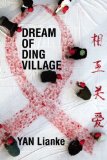
by Yan Lianke
Officially censored upon its Chinese publication, and the subject of a bitter lawsuit between author and publisher, Dream of Ding Village is Chinese novelist Yan Lianke’s most important novel to date. Set in a poor village in Henan province, it is a deeply moving and beautifully written account of a blood-selling scandal in contemporary China. As the book opens, the town directors, looking for a way to lift their village from poverty, decide to open a dozen blood-plasma collection stations, with the hope of draining the townspeople of their blood and selling it to villages near and far.
Although the citizens prosper in the short run, the rampant blood-selling leads to an outbreak of AIDS and huge loss of life. Narrated by the dead grandson of the village head and written in finely crafted, affecting prose, the novel presents a powerful absurdist allegory of the moral vacuum at the heart of communist-capitalist China as it traces the life and death of an entire community.
Based on a real-life blood-selling scandal in eastern China, Dream of Ding Village is the result of three years of undercover work by Yan Lianke, who worked as an assistant to a well-known Beijing anthropologist in an effort to study a small village decimated by HIV/AIDS as a result of unregulated blood selling. Whole villages were wiped out with no responsibility taken or reparations paid. Dream of Ding Village focuses on one family, destroyed when one son rises to the top of the Party pile as he exploits the situation, while another son is infected and dies. The result is a passionate and steely critique of the rate at which China is developing - and what happens to those who get in the way.
"Starred Review. The book's prolixity, combined with scenes that drag or come off as forced, certainly doesn't ruin the experience, but it does occasionally glut what amounts to a heartening cry for moral responsibility in the thick of maddening injustice." - Publishers Weekly
"Like his literary contemporaries Mo Yan and Yu Hua, Yan's unflinching irreverence makes this Schadenfreude tragedy essential reading." - Library Journal
This information about Dream of Ding Village was first featured
in "The BookBrowse Review" - BookBrowse's membership magazine, and in our weekly "Publishing This Week" newsletter. Publication information is for the USA, and (unless stated otherwise) represents the first print edition. The reviews are necessarily limited to those that were available to us ahead of publication. If you are the publisher or author and feel that they do not properly reflect the range of media opinion now available, send us a message with the mainstream reviews that you would like to see added.
Any "Author Information" displayed below reflects the author's biography at the time this particular book was published.
Yan Lianke was born in 1958 in Henan Province, China. He is the author of numerous story collections and novels, including The Day the Sun Died; The Years, Months, Days; The Explosion Chronicles; The Four Books; Lenin's Kisses; Serve the People!; and Dream of Ding Village. Among many accolades, he was awarded the Franz Kafka Prize, he was twice a finalist for the Man Booker International Prize, and he has been shortlisted for the Independent Foreign Fiction Prize, the Man Asian Literary Prize, and the Prix Femina Étranger. He has received two of China's most prestigious literary honors, the Lu Xun Prize and the Lao She Award. He lives and writes in Beijing.
The library is the temple of learning, and learning has liberated more people than all the wars in history
Click Here to find out who said this, as well as discovering other famous literary quotes!
Your guide toexceptional books
BookBrowse seeks out and recommends the best in contemporary fiction and nonfiction—books that not only engage and entertain but also deepen our understanding of ourselves and the world around us.